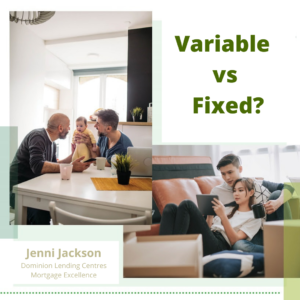VARIABLE vs FIXED
When it comes to mortgages, the age-old question remains: “Should I go with a variable or a fixed-rate?”. To make an informed decision, it is important to look at not only the historical trends, but to also be aware of your own comfort level. There is no advice that can be a blanket solution for all borrowers and for every situation.
When it comes to variable versus fixed-rate, it is important to understand what these mortgages are based off of:
Fixed Rates
Fixed mortgages are so named as they are based on a fixed interest rate that is set for the duration of the term with fixed payments. These rates are based primarily on the Canadian bond yields – as yields rise, you can expect an increase in the fixed interest rates being offered to Borrowers. Once you accept your mortgage commitment with a lender, that rate is guaranteed for the duration of your term.
Variable Rates
On the other hand, variable-rate mortgages fluctuate with the Prime Rate. This can either mean fluctuations in your payment or – if you choose to have set payments – the interest portion of the payment will flucuate. The Prime Rate is directly affected by the Bank of Canada’s overnight lending rate – as this rate fluctuates, so does the Prime Rate.
In the last 10 years, the prime lending rate has gone from 2.50% to 3.95% and now sits at 2.45% as of January 2022. Due to recent events, these rates have seen a downturn – providing huge benefits to new borrowers looking to pay as little as possible.
While a variable-rate mortgage could cause fluctuations in interest being paid, historically, the choice of a variable rate mortgage over a fixed rate has allowed borrowers to save in interest costs. Particularly because variable rate mortgages are often offered at a much lower rate than their counterpart, the fixed rate.
The uncertainty of a variable rate; however, means that this is not a product for everyone and it comes down to the borrowers comfort. Some individuals have no wiggle room in their budget for potential changes in mortgage payments, or they do not like the uncertainty of not knowing exactly what their mortgage payment will be each month. For these clients, a fixed-rate would be the best choice.
If clients are comfortable with a variable-rate mortgage, they have a unique opportunity to take advantage of lower interest rates. One option is to set your mortgage to a fixed-payment so that if the interest rate drops, it means you are paying more on your principal amount each month. On average, every 10% increase in payment can save three years off the amortization of a five-year term and so having fixed payments can provide extra benefits with falling interest rates. Or, if your payments are set to flucuate, you may see your monthly payments drop in accordance to decreases in the Prime Rate.
But what if the Prime Rate increases?
If your payments are set to flucuate with each change, then no action is needed on your part. If you have set your payments to a fixed amount, you will want to consult with your Mortgage Broker to ensure that your payment is set at an acceptable level to ensure that not only the interest is being paid, but that an appropriate amount of the principal is being paid as well. This is where accessing the skills of a knowledgeable Mortgage Broker are a huge advantage. If you choose a variable rate, know that it would take several increases in Prime Rate to catch up to where fixed rates are currently at. I inform all of my variable rate clients any time there is a change to the Prime Rate so that you are kept up-to-date!
Most lenders will allow you to convert your variable rate to a fixed rate if you begin to feel uncomfortable with the flucuations. Your lender will convert your mortgage to the rate that closest matches your remaining term. As an example, if you are in a 5 year term and have 3 years remaining, the lender will convert your current variable rate into a 3-year term fixed rate.
Differences in Penalty
A big benefit to variable-rate mortgages is that if you choose to sell before the mortgage term is up, the penalty is typically only three months interest as opposed to the much heavier interest rate differential (IRD) calculation used to determine fixed-rate mortgage penalties. This can provide you with more flexibility if you find yourself needing to make a change to your mortgage mid-term.
There are a few statistics out there that state that over 60% of homeowners break their mortgage term within the first 3 years. The difference between three months of interest as a penalty or an IRD calculation can be several thousand dollars.
If your mortgage is maturing in the next 60-180 days and you’re not quite sure what to do, give me a call! Not only can I provide tips for your existing mortgage to help save you money, but I can also help you assess whether there is a better product available and if you should make the switch to a new lender.

